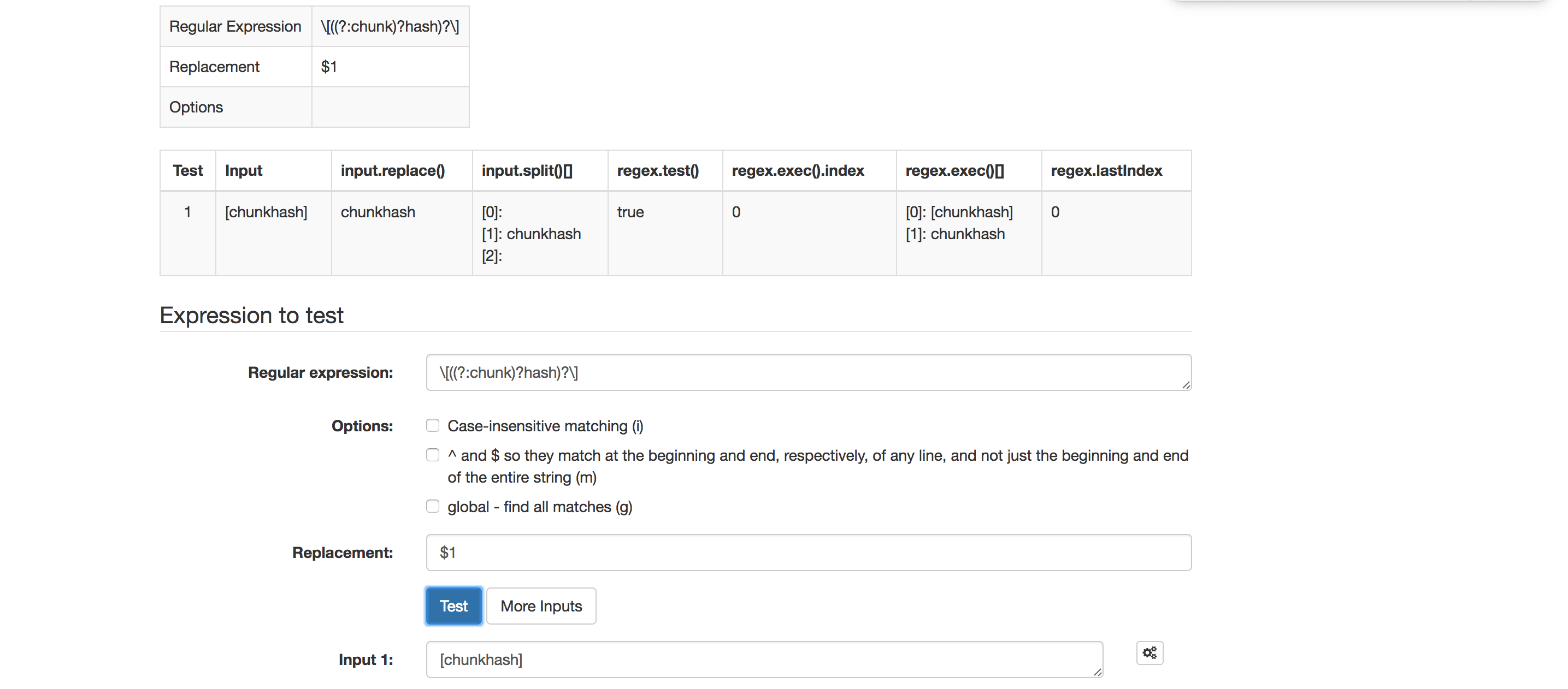Webpack plugin that emits a json file with assets paths.
- Install
- Why Is This Useful?
- Configuration
- Test
If you are working with an older version of Webpack, you can use the most recent 5.x.x release (5.1.2).
npm install assets-webpack-plugin --save-devIf you're using Webpack 4 or below:
npm install [email protected] --save-devWhen working with Webpack you might want to generate your bundles with a generated hash in them (for cache busting).
This plug-in outputs a json file with the paths of the generated assets so you can find them from somewhere else.
The output is a JSON object in the form:
{
"bundle_name": {
"asset_kind": "/public/path/to/asset"
}
}Where:
"bundle_name"is the name of the bundle (the key of the entry object in your webpack config, or "main" if your entry is an array)."asset_kind"is the camel-cased file extension of the asset
For example, given the following webpack config:
{
entry: {
one: ['src/one.js'],
two: ['src/two.js']
},
output: {
path: path.join(__dirname, "public", "js"),
publicPath: "/js/",
filename: '[name]_[hash].bundle.js'
}
}The plugin will output the following json file:
{
"one": {
"js": "/js/one_2bb80372ebe8047a68d4.bundle.js"
},
"two": {
"js": "/js/two_2bb80372ebe8047a68d4.bundle.js"
}
}In your webpack config include the plug-in. And add it to your config:
var path = require('path')
var AssetsPlugin = require('assets-webpack-plugin')
var assetsPluginInstance = new AssetsPlugin()
module.exports = {
// ...
output: {
path: path.join(__dirname, "public", "js"),
filename: "[name]-bundle-[hash].js",
publicPath: "/js/"
},
// ....
plugins: [assetsPluginInstance]
}You can pass the following options:
Optional. webpack-assets.json by default.
Name for the created json file.
new AssetsPlugin({filename: 'assets.json'})Optional. true by default.
If false the output will not include the full path
of the generated file.
new AssetsPlugin({fullPath: false})e.g.
/public/path/bundle.js vs bundle.js
Optional. false by default.
If true the full path will automatically be stripped of the /auto/ prefix generated by webpack.
new AssetsPlugin({removeFullPathAutoPrefix: true})e.g.
/public/path/bundle.js vs bundle.js
Optional. false by default.
Inserts the manifest javascript as a text property in your assets.
Accepts the name or names of your manifest chunk. A manifest is the last CommonChunk that
only contains the webpack bootstrap code. This is useful for production
use when you want to inline the manifest in your HTML skeleton for long-term caching.
See issue #1315
or a blog post
to learn more.
new AssetsPlugin({includeManifest: 'manifest'})
// assets.json:
// {entries: {manifest: {js: `hashed_manifest.js`, text: 'function(modules)...'}}}
//
// Your html template:
// <script>
// {assets.entries.manifest.text}
// </script>The includeManifest option also accepts an array of manifests:
new AssetsPlugin({includeManifest: ['manifest1', 'manifest2']})
// assets.json:
// {entries: {
// manifest1: {js: `hashed_manifest.js`, text: 'function(modules)...'},
// manifest2: {js: `hashed_manifest.js`, text: 'function(modules)...'}
// }}Optional. false by default.
Orders the assets output so that manifest is the first entry. This is useful for cases where script tags are generated from the assets json output, and order of import is important.
new AssetsPlugin({manifestFirst: true})Optional. Defaults to the current directory.
Path where to save the created JSON file. Will default to the highest level of the project unless useCompilerPath is specified.
new AssetsPlugin({path: path.join(__dirname, 'app', 'views')})new AssetsPlugin({useCompilerPath: true})Will override the path to use the compiler output path set in your webpack config.
Optional. false by default.
Whether to format the JSON output for readability.
new AssetsPlugin({prettyPrint: true})Optional. Defaults is JSON stringify function.
Formats the assets output.
new AssetsPlugin({
processOutput: function (assets) {
return 'window.staticMap = ' + JSON.stringify(assets)
}
})Optional. false by default.
When set to true, the output JSON file will be updated instead of overwritten.
new AssetsPlugin({update: true})Inject metadata into the output file. All values will be injected into the key "metadata".
new AssetsPlugin({metadata: {version: 123}})
// Manifest will now contain:
// {
// metadata: {version: 123}
// }Optional. true by default.
When set false, falls back to the fileTypes option array to decide which file types to include in the assets file.
new AssetsPlugin({includeAllFileTypes: false})Optional. ['js', 'css'] by default.
When set and includeAllFileTypes is set false, only assets matching these types will be included in the assets file.
new AssetsPlugin({fileTypes: ['js', 'jpg']})Optional. false by default.
When set the assets file will only be generated in memory while running webpack-dev-server and not written to disk.
new AssetsPlugin({keepInMemory: true})Optional. false by default.
When set the output from webpack-subresource-integrity is included in the assets file.
Please make sure you have webpack-subresource-integrity installed and included in your webpack plugins.
new AssetsPlugin({integrity: true})Output will now look like this:
{
"main": {
"js": "/bundle.js",
"jsIntegrity": "sha256-ANGwtktWN96nvBI/cjekdTvd0Dwf7SciIFTQ2lpTxGc= sha384-Ly439pF3K+J8hnhk1BEcjKnv1R9BApFYVIVJvr64PcgBjdT4N7hfPzQynItHwcaO"
},
"vendors~main": {
"js": "/1.bundle.js",
"jsIntegrity": "sha256-yqNi1hgeAdkXVOORgmVMeX+cbuXikoj6I8qWZjPegsA= sha384-4X75tnsGDwnwL5kBUPsx2ko9DeWy0xM8BcDQdoR185yho+OnxjjPXl2wCdebLWTG"
}
}Optional. false by default.
If the 'entrypoints' option is given, the output will be limited to the entrypoints and the chunks associated with them.
new AssetsPlugin({entrypoints: true})Optional. false by default.
When set and entrypoints is set true, will output any files that are part of the unnamed chunk to an additional unnamed ("") entry.
new AssetsPlugin({includeFilesWithoutChunk: true})Optional. false by default.
When set, will output any files that are part of the chunk and marked as auxiliary assets.
new AssetsPlugin({includeAuxiliaryAssets: true})Optional. false by default.
When set, will output any files that are part of the chunk and marked as preloadable or prefechtable child assets via a dynamic import. See: https://webpack.js.org/guides/code-splitting/#prefetchingpreloading-modules
new AssetsPlugin({includeDynamicImportedAssets: true})If you use webpack multi-compiler mode and want your assets written to a single file, you must use the same instance of the plugin in the different configurations.
For example:
var webpack = require('webpack')
var AssetsPlugin = require('assets-webpack-plugin')
var assetsPluginInstance = new AssetsPlugin()
webpack([
{
entry: {one: 'src/one.js'},
output: {path: 'build', filename: 'one-bundle.js'},
plugins: [assetsPluginInstance]
},
{
entry: {two:'src/two.js'},
output: {path: 'build', filename: 'two-bundle.js'},
plugins: [assetsPluginInstance]
}
])You can use this with Rails to find the bundled Webpack assets via Sprockets.
In ApplicationController you might have:
def script_for(bundle)
path = Rails.root.join('app', 'views', 'webpack-assets.json') # This is the file generated by the plug-in
file = File.read(path)
json = JSON.parse(file)
json[bundle]['js']
endThen in the actions:
def show
@script = script_for('clients') # this will retrieve the bundle named 'clients'
endAnd finally in the views:
<div id="app">
<script src="<%= @script %>"></script>
</div>You can use this with ASP.NET Core via the WebpackTag library.
npm test



